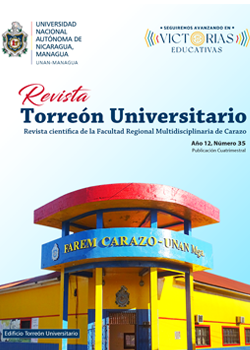Employment situation of the graduates of the headquarters of the Bluefields Indian & Caribbean University (BICU)
DOI:
https://doi.org/10.5377/rtu.v12i35.17001Keywords:
Higher education, Graduate, Strategies, Employment situationAbstract
Higher education, as a service provided by HEIs, is essential for the specialization of knowledge and the development of a country. The theme that is developed in this research is aimed at contextualizing the situation of BICU graduates at the academic level of the regular shift at its headquarters, taking into account four aspects: general data, academic profile, assessment of teaching and situation labor. The development of the research was carried out according to the qualitative approach, considering the period 2015-2020 and taking into account 190 graduates from 11 careers. In the results, recommendations are presented for the follow-up of the graduates of the university, such as: creating a follow-up system for graduates that allows having structured, continuous, reliable and detailed information on the academic and work performance of these and create an institutional monitoring policy that is executed through an office attached to the Office of the Academic Vice-Rector. The most important conclusion is that 63.7% of the graduates and graduates in the 2015-2020 period, of the regular modality, academic degree level, are working and that 36.3% are unemployed, expressing a quite positive relationship.
Downloads
References
Banco Central de Nicaragua. (junio de 2022). Banco Central de Nicaragua . Obtenido de Banco Central de Nicaragua: https://www.bcn.gob.ni/sites/default/files/estadisticas/sector_real/mercado_laboral/3-4.htm
BICU. (2021). Estadisticas 20215-2020. Bluefields: BICU.
Cajina, I. (27 de Noviembre de 2020). Economía: Nicaragua investiga. Obtenido de Nicaragua investiga: https://nicaraguainvestiga.com/economia/41623-acceso-de-jovenes-recien-egresados-al-mercado-laboral-es-cada-vez-mas-dificil-por-agudizacion-de-crisis/
CNEA. (2020). Glosario de Educación Superior de Nicaragua Tercera edición. Managua.
Domelis, M. A. (2009). Desarrollo de un Instrumento para Medir la Satisfacción Estudiantil en Educación Superior. Venezuela: Universidad Central de Venezuela.
Enríquez, A. y. (2015). Empleo. Mexíco DF: Serie de Estudios Económicos.
Holman Bladimir Boquín Álvarez, A. d. (2007). Análisis situacional sobre la inserción en el mercdo laboral de los egresados de la facultad CC.EE.EE, UNAN León; período de febrero a mayo 2007. León, Nicaragua: UNAN León.
Instituto Tecnológico Metropolitano. (2019). Modelo de satisfacción de egresados universitarios: un estudio de caso. CEA, Vol.5, núm. 10, pp.49-68.
Jaramilo, A. (2013). Guía para la verificación de condiciones institucionales para el otorgamiento del registro calificado. Bogotá: SECAB-PUBLICACIONES.
Jessica Gabriela Cáceres Carcache, E. W. (2017). Relación del modelo profesional y el desempeño laboral de los graduados de la carrera Licenciatura en Enfermería Materno Infantil, que realizaron servicio social de marzo 2015 a marzo 2016, cohorte 2010-2024, I y II semestre 2016. Managua: https://repositorio.unan.edu.ni/4310/1/96344.pdf.
Mendoza, J. F., & Flores-Pacheco, J. A. (2021). Competencias digitales en la formación continua del profesorado, un estudio de caso para la Bluefields Indian & Caribbean University - BICU, Nicaragua. Revista Científica De FAREM-Estelí, 10(39), 157–169. https://doi.org/10.5377/farem.v10i39.12621
Morales, S. R. (2020). Situación laboral de egresados de administración de la universidad catolica de Pereira. Risaralda Pereira: Santiago.ruiz@ucp.edu.co.
PNUD. (2015). Panorama General Informe sobre Desarrollo Humano 2015. Washington: Communications Development Incorporated.
Pronicaragua. (2020). Perfil Demográfico 2020. Managua: Pronicaragua.
Salvador, B. C. (2017). Glosario Términos Técnicos y conceptos económicos. El Salvador: Banco Central de Reserva de El Salvador.
Sánchez, R. F. (2018). Análisis de la situación laboral de los egresados de la Universidad de Colima del periodo 2010-2013. México: Revista de economía regional y sectorial, vol. 10, núm. 2, pp. 149-176.
Vargas, B. E. (2011). Economía I. Colombia: Espacio Gráfico Comunicaciones S.A
Downloads
Published
Issue
Section
License
Copyright (c) 2023 National Autonomous University of Nicaragua, Managua

This work is licensed under a Creative Commons Attribution-NonCommercial-NoDerivatives 4.0 International License.
The authors who publish in this journal agree to the following terms.
- The author or authors of the articles, essays or research grant the National Autonomous University of Nicaragua, Managua (UNAN-Managua) the editing rights (copyright) of the submitted work, therefore the University has the exclusive right to publish the article for the entire copyright period.
- These copyrights/authors authorize Torreón Universitario Magazine and the University to edit and disseminate/publish the article in said Magazine, including printed and electronic reproduction, storage, retrieval and any other type of publication, and sources of secondary information as services. of summaries and databases, they also empower it to protect the article against unauthorized use for dissemination by printed or electronic media (PDF, HTML, EPUB, XML or others).
License for use of content
The magazine uses the Creative Commons Attribution-NonCommercial-NoDerivs 4.0 International License.
Under this statement:

This journal is licensed under a Creative Commons Attribution-NonCommercial-NoDerivatives 4.0 International License. It can be copied, distributed and transmitted publicly as long as the author and source are cited (Revista Torreón Universitario), it should not be modified or used for any commercial purpose. The full license can be found at http://creativecommons.org/licenses/by-nc-nd/4.0/.



